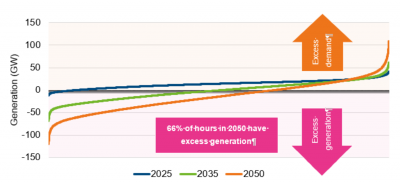Retail electricity in the REMA future
The REMA scenario expects/desires a future of (over?)-investment in intermittent renewables so they dominate electricity generation. The plot below shows hourly (day and night) distribution of excess demand in a given year in their scenario.
By 2035, excess generation is expected half of the time, by 2050, 66% of the time, perhaps with excess generation lasting many days. Because intermittent renewables have high capital costs but very low short-run marginal costs, the price of electricity will be zero/negative in a market structured like that today. The consequent price cannibalisation will make it impossible to recover the long-run costs of maintaining supply of that electricity and consequently, attracting the £260-400 billion BEIS wants invested into the transition. Also, while capacity will be required to cover periods of excess demand (e.g. low wind/sun), there will also be fewer opportunities to recover the investment costs for supplying that cover which will drive up the cost when cover is needed. They are therefore very interested in market structures where those costs can be recovered.
Anyway, so much for that, but where would we stand as electricity consumers? It appears to me that installing solar panels may not generate a decent return in that future since there could be significant amounts of cheap electricity available. Instead, having battery capacity to store up excess generation for later use could pay dividends.
Also, there is an industry with near-zero marginal costs today, telecoms. Will there be tariffs in future that sell bundles of off-peak kWh like mobile phone contracts today?
Hi @Ronin92, interesting post.
A lot of what you say is new to me... I've heard of this review of electricity markets arrangements, but I'm hazy on the economics... will read up!
But being able to buy a bundle of off peak kWh would be absolutely perfect for me. Heat pump user and I'll sign up now, if it were available.
Indeed, it almost leads to another question. I know how much my heat pump consumption is per year. Why can't I 'bulk buy' my HP consumption a year in advance already (in 2023)? I know I'm an individual customer, but if I could get onto the futures market I could buy my energy ahead (just like the supply companies buy their electricity ahead). I would even promise not to use my HP during peak hours and my supplier is welcome to come and install a meter on my HP and charge me a fine if I do run it during peak hours. To me, this is the kind of thing we should be doing already, not in 2035.
Posted by: @benguelaHi @Ronin92, interesting post.
A lot of what you say is new to me... I've heard of this review of electricity markets arrangements, but I'm hazy on the economics... will read up!
But being able to buy a bundle of off peak kWh would be absolutely perfect for me. Heat pump user and I'll sign up now, if it were available.
Indeed, it almost leads to another question. I know how much my heat pump consumption is per year. Why can't I 'bulk buy' my HP consumption a year in advance? I know I'm an individual customer, but if I could get onto the futures market I could buy my energy ahead (just like the supply companies buy their electricity ahead). I would even promise not to use my HP during peak hours and my supplier is welcome to come and install a meter on my HP and charge me a fine if I do run it during peak hours.
If my understanding is correct, it is the buying ahead that is keeping both gas and electricity prices high, for consumers at the moment. I do believe that the market spot price is now lower than the Energy Price Guarantee, but the energy suppliers are still paying much higher prices to the energy producers, hence the very high profits that are being announced by various companies.
- 27 Forums
- 2,520 Topics
- 58.6 K Posts
- 565 Online
- 6,800 Members
Join Us!
Worth Watching
Latest Posts
-

RE: Peak Energy Products V therm 16kW unit heat pump not reaching flow temperature
Yes, here's mine. From the service manual parts numbers...
By bobflux , 24 minutes ago
-

Had to learn the hard way 🤣 now I'm sharing T...
By bobflux , 40 minutes ago
-

RE: Issue with a Grant Air Source Heat Pump & Tado Smart Thermostat
Im assuming from your original post that hysterisis ref...
By JamesPa , 1 hour ago
-
RE: Heat Pump vs New Gas Boiler for Inherited House - Worth the Extra Cost?
Hi @fretless6 Mike, I have experience with Taggas (Re...
By Old_Scientist , 4 hours ago
-
RE: Daikin Altherma 3 LT compressor longevity question
@bobflux With my limited HA skills I can't ad...
By Ubert767 , 5 hours ago
-

RE: Underfloor Heating Installation Issues with Heat Pump
I'm going to install Thermacome ACOSI+ radiant ceiling....
By bobflux , 7 hours ago
-
RE: Testing new controls/monitoring for Midea Clone ASHP
Now seems a good time to summarise the costs and effici...
By benson , 8 hours ago
-

RE: Tell us about your Solar (PV) setup
@mk4 Charge to 100%, discharge down to 10%.
By bobflux , 9 hours ago
-
RE: Connecting Growatt SPH5000 over wired ethernet rather than wireless
The simplest wired option is usually the Growatt Ethern...
By Jonatan , 15 hours ago
-

RE: Electricity price predictions
@jamespa And it seems some of the nasty public cloud...
By Batpred , 22 hours ago
-

RE: Jokes and fun posts about heat pumps and renewables
Technology is rapidly advancing. BBC News reported th...
By Transparent , 1 day ago
-

RE: Do Fridges and Freezers have COP ratings?
@editor Thank you all for your replies and submitted in...
By Toodles , 1 day ago
-

I know and yes. The secondary deltaT wont necessaril...
By JamesPa , 1 day ago
-

RE: Designing heating system with air to water heat pump in France, near Lyon
Just love the way you put it! 🤣
By Batpred , 2 days ago
-

RE: Safety update; RCBOs supplying inverters or storage batteries
Thank you for sharing. So it seems that your Schneid...
By Batpred , 2 days ago
-

RE: Forum updates, announcements & issues
@upnorthandpersonal thanks for the thoughtful, consider...
By Mars , 2 days ago
-

RE: Solar Power Output – Let’s Compare Generation Figures
@mk4 All 21 panels have their own Enphase IQ7a microinv...
By Toodles , 2 days ago
-
RE: Setback savings - fact or fiction?
Great, so you have proven that MELCloud is consistently...
By RobS , 3 days ago
-
RE: Mitsu PUHZ120Y 'Outdoor Temp 'error?
Thanks David & James It almos...
By DavidAlgarve , 3 days ago
-

RE: Surge protection devices SPDs
@trebor12345 - your original Topic about the right type...
By Transparent , 3 days ago
-

RE: Help needed with Samsung AE120RXYDEG
@tomf I’ve been sent this from a service engineer at Sa...
By Mars , 3 days ago
-

RE: Buying large amp bidirectional RCD and RCBO
Yes... I went through this particular headache and ende...
By bobflux , 4 days ago
-

O-oh! Let's take this as an opportunity to 'pass the ...
By Transparent , 4 days ago




